2020人教版新目标八年级下册Unit 3 Could you please clean your room?知识点复习课件(共35张ppt)
文档属性
| 名称 | 2020人教版新目标八年级下册Unit 3 Could you please clean your room?知识点复习课件(共35张ppt) | 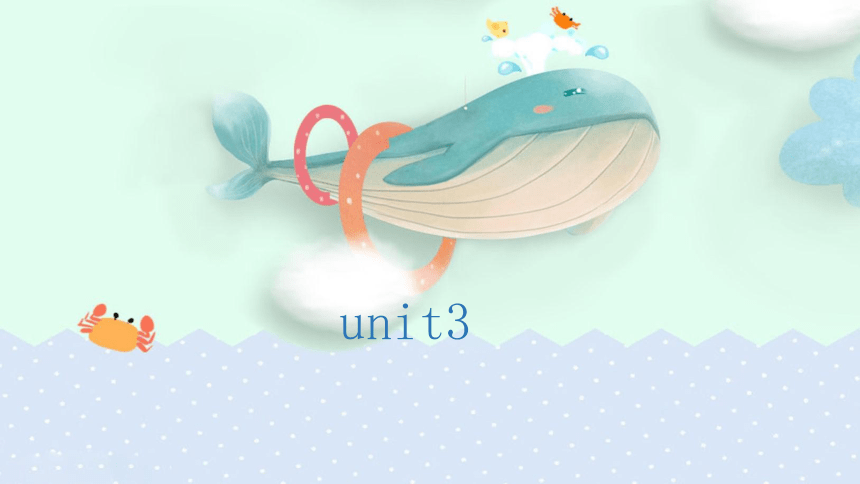 | |
| 格式 | zip | ||
| 文件大小 | 2.6MB | ||
| 资源类型 | 教案 | ||
| 版本资源 | 人教新目标(Go for it)版 | ||
| 科目 | 英语 | ||
| 更新时间 | 2020-02-22 09:48:04 | ||
图片预览

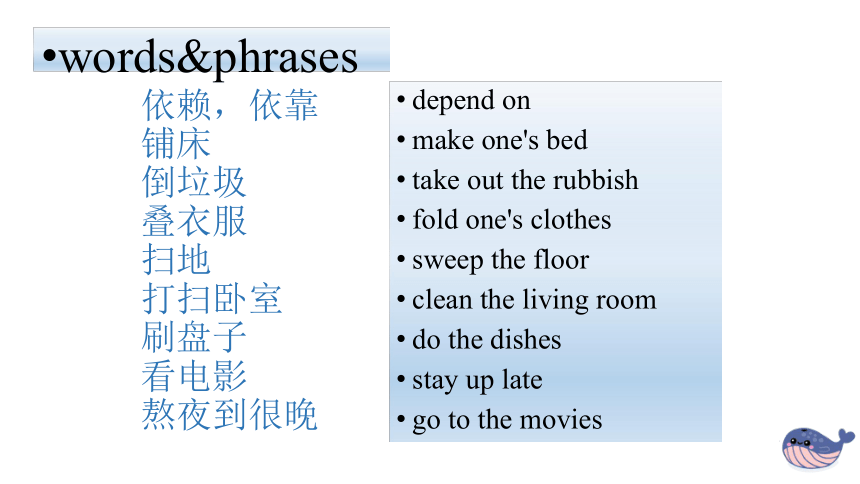
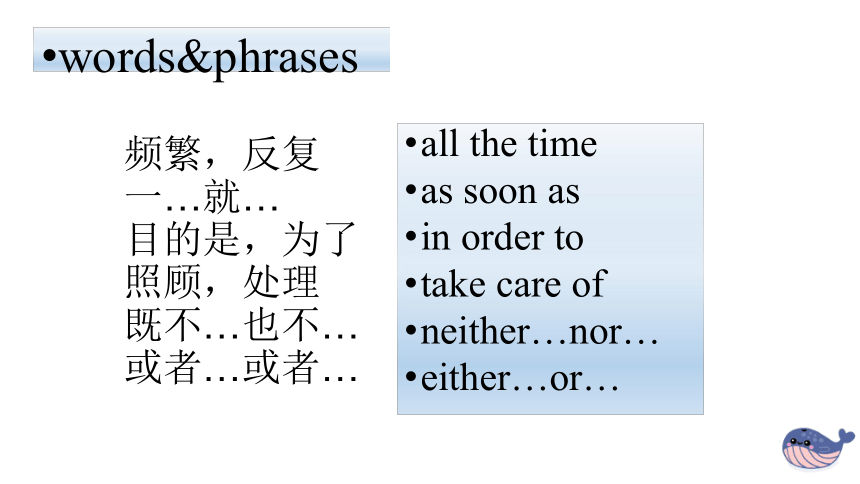
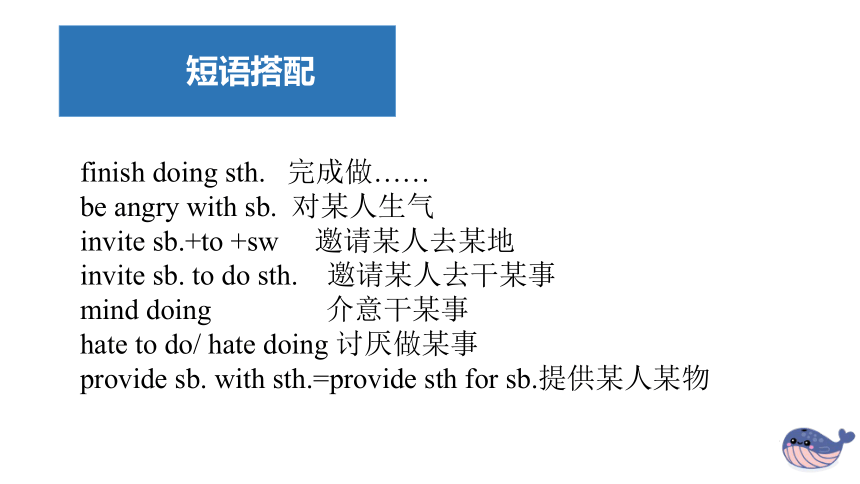
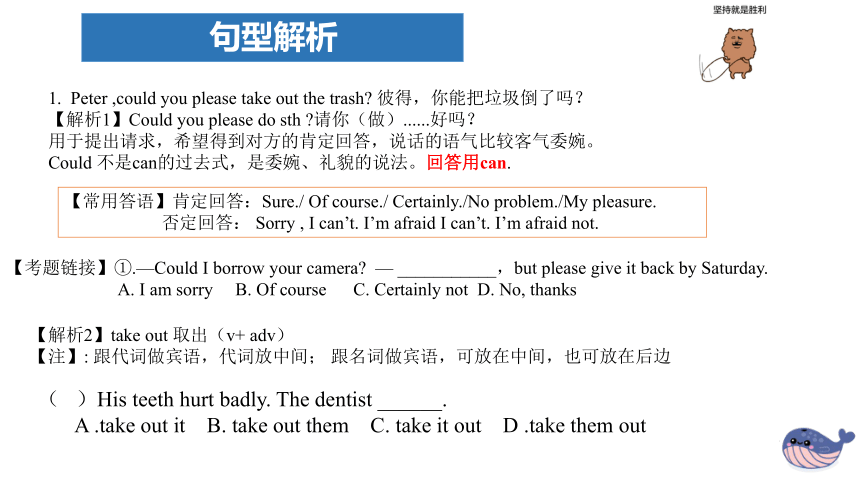
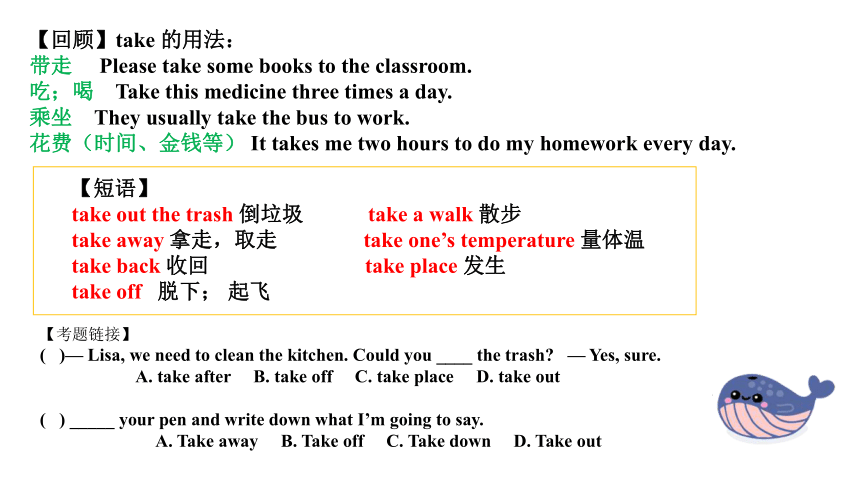
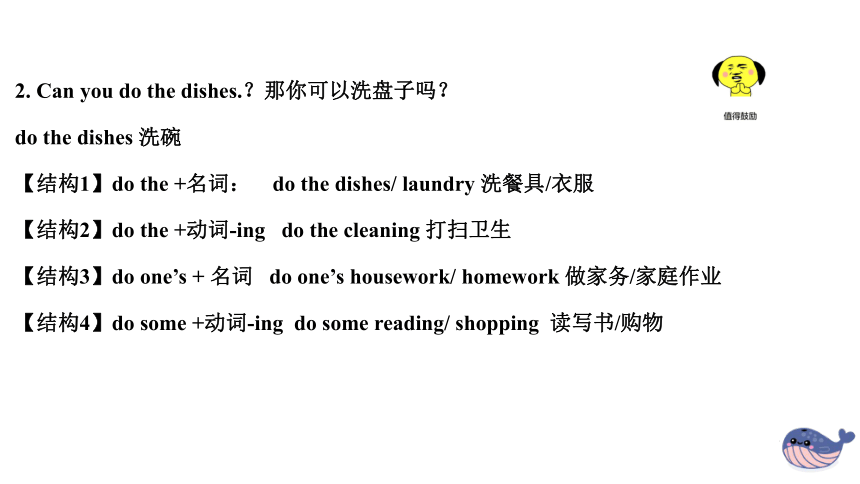
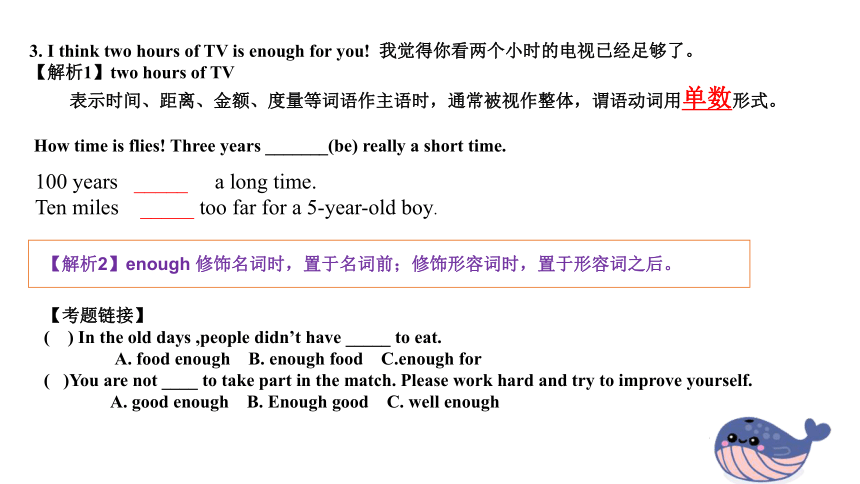
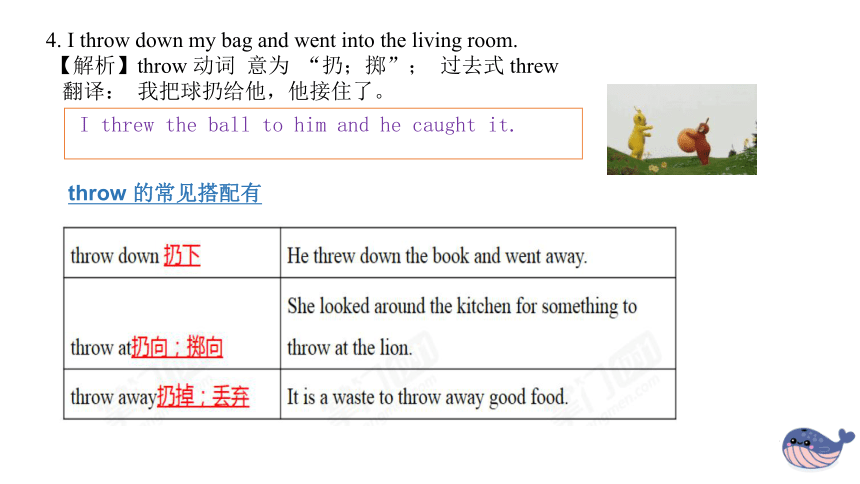
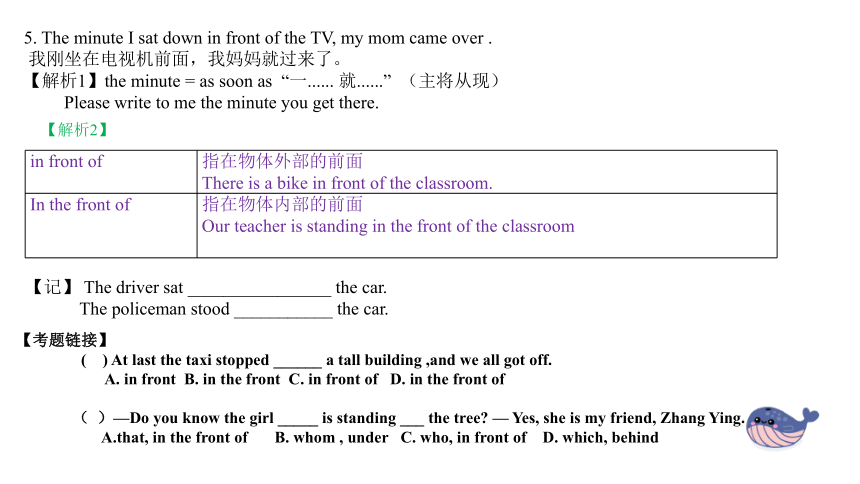
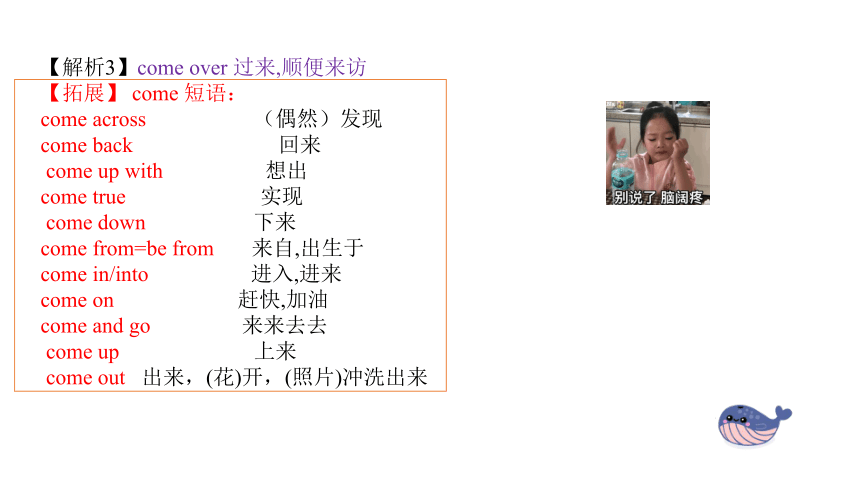
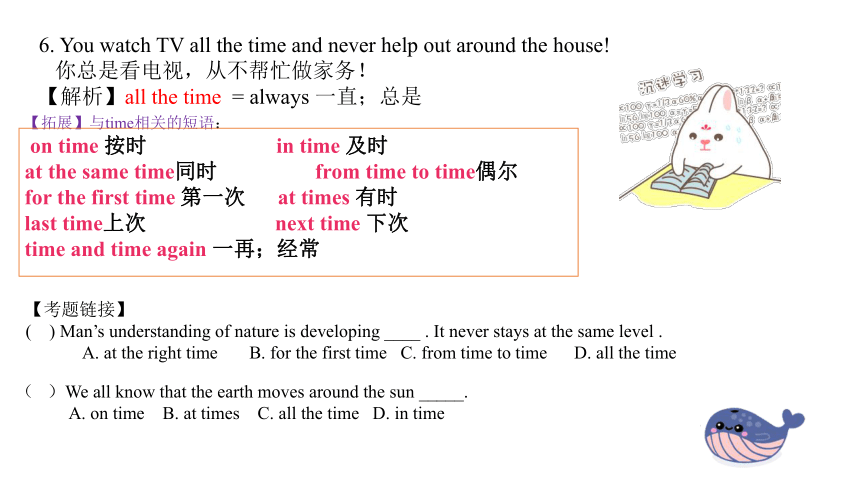
文档简介
(共36张PPT)
unit3
依赖,依靠
铺床
倒垃圾
叠衣服
扫地
打扫卧室
刷盘子
看电影
熬夜到很晚
depend on
make one's bed
take out the rubbish
fold one's clothes
sweep the floor
clean the living room
do the dishes
stay up late
go to the movies
words&phrases
频繁,反复
一…就…
目的是,为了
照顾,处理
既不…也不…
或者…或者…
all the time
as soon as
in order to
take care of
neither…nor…
either…or…
words&phrases
短语搭配
finish doing sth. 完成做……
be angry with sb. 对某人生气
invite sb.+to +sw 邀请某人去某地
invite sb. to do sth. 邀请某人去干某事
mind doing 介意干某事
hate to do/ hate doing 讨厌做某事
provide sb. with sth.=provide sth for sb.提供某人某物
1. Peter ,could you please take out the trash? 彼得,你能把垃圾倒了吗?
【解析1】Could you please do sth ?请你(做)......好吗?
用于提出请求,希望得到对方的肯定回答,说话的语气比较客气委婉。
Could 不是can的过去式,是委婉、礼貌的说法。回答用can.
【常用答语】肯定回答:Sure./ Of course./ Certainly./No problem./My pleasure.
否定回答: Sorry , I can’t. I’m afraid I can’t. I’m afraid not.
【考题链接】①.—Could I borrow your camera? — ___________,but please give it back by Saturday.
A. I am sorry B. Of course C. Certainly not D. No, thanks
【解析2】take out 取出(v+ adv)
【注】: 跟代词做宾语,代词放中间; 跟名词做宾语,可放在中间,也可放在后边
( )His teeth hurt badly. The dentist ______.
A .take out it B. take out them C. take it out D .take them out
句型解析
【回顾】take 的用法:
带走 Please take some books to the classroom.
吃;喝 Take this medicine three times a day.
乘坐 They usually take the bus to work.
花费(时间、金钱等) It takes me two hours to do my homework every day.
【短语】
take out the trash 倒垃圾 take a walk 散步
take away 拿走,取走 take one’s temperature 量体温
take back 收回 take place 发生
take off 脱下; 起飞
【考题链接】
( )— Lisa, we need to clean the kitchen. Could you ____ the trash? — Yes, sure.
A. take after B. take off C. take place D. take out
( ) _____ your pen and write down what I’m going to say.
A. Take away B. Take off C. Take down D. Take out
2. Can you do the dishes.?那你可以洗盘子吗?
do the dishes 洗碗
【结构1】do the +名词: do the dishes/ laundry 洗餐具/衣服
【结构2】do the +动词-ing do the cleaning 打扫卫生
【结构3】do one’s + 名词 do one’s housework/ homework 做家务/家庭作业
【结构4】do some +动词-ing do some reading/ shopping 读写书/购物
3. I think two hours of TV is enough for you! 我觉得你看两个小时的电视已经足够了。
【解析1】two hours of TV
表示时间、距离、金额、度量等词语作主语时,通常被视作整体,谓语动词用单数形式。
How time is flies! Three years _______(be) really a short time.
【解析2】enough 修饰名词时,置于名词前;修饰形容词时,置于形容词之后。
【考题链接】
( ) In the old days ,people didn’t have _____ to eat.
A. food enough B. enough food C.enough for
( )You are not ____ to take part in the match. Please work hard and try to improve yourself.
A. good enough B. Enough good C. well enough
100 years _____ a long time.
Ten miles _____ too far for a 5-year-old boy.
4. I throw down my bag and went into the living room.
【解析】throw 动词 意为 “扔;掷”; 过去式 threw
翻译: 我把球扔给他,他接住了。
I threw the ball to him and he caught it.
throw 的常见搭配有
5. The minute I sat down in front of the TV, my mom came over .
我刚坐在电视机前面,我妈妈就过来了。
【解析1】the minute = as soon as “一...... 就......” (主将从现)
Please write to me the minute you get there.
【解析2】
in front of 指在物体外部的前面
There is a bike in front of the classroom.
In the front of 指在物体内部的前面
Our teacher is standing in the front of the classroom
?
【记】 The driver sat ________________ the car.
The policeman stood ___________ the car.
【考题链接】
( ) At last the taxi stopped ______ a tall building ,and we all got off.
A. in front B. in the front C. in front of D. in the front of
( )—Do you know the girl _____ is standing ___ the tree? — Yes, she is my friend, Zhang Ying.
A.that, in the front of B. whom , under C. who, in front of D. which, behind
【解析3】come over 过来,顺便来访
【拓展】 come 短语:
come across (偶然)发现
come back 回来
come up with 想出
come true 实现
come down 下来
come from=be from 来自,出生于
come in/into 进入,进来
come on 赶快,加油
come and go 来来去去
come up 上来
come out 出来,(花)开,(照片)冲洗出来
6. You watch TV all the time and never help out around the house!
你总是看电视,从不帮忙做家务!
【解析】all the time = always 一直;总是
【拓展】与time相关的短语:
on time 按时 in time 及时
at the same time同时 from time to time偶尔
for the first time 第一次 at times 有时
last time上次 next time 下次
time and time again 一再;经常
【考题链接】
( ) Man’s understanding of nature is developing ____ . It never stays at the same level .
A. at the right time B. for the first time C. from time to time D. all the time
( )We all know that the earth moves around the sun _____.
A. on time B. at times C. all the time D. in time
7. I’m just as tired as you are! 我和你一样累!
【解析】as...as ... 和......一样...... 中间加形容词或副词
【注】比较级倍数表达句型为:倍数+as+形容词、副词原级+as+比较对象
【考题链接】
①There are a small number of people involved, possibly ______twenty.
A. as few as B. as little as C. as many as D. as much as
② It’s said that the power plant is now____ large as what it was.
A. twice as B. as twice C. twice much D. much twice
③Liu Ying is good at singing. She sings ______the famous singer, CoCo.
A. as well as B. as good as C. as better as D. as the best as
8. For one week, she did not do any housework and neither did I.
一周时间,她没有做任何家务,我也没有做。
1)“neither+助动词/系动词/情态动词+主语”表示上句否定的情况也适合于后者。
【衔接】:“so+助动词/系动词(be)/情态动词+主语”表示后面的主语“亦如此,也同样”,说明前面的肯定情况同样也适用于后者。前面的主语和后面的主语不是同一个人物。
—You watched TV last night.你们昨晚看了电视。
—So did the children.孩子们也看了。
2) neither两者都不,后可跟of,做主语时,谓语动词用三单。
3)neither …nor… 既不…也不…,
连接两个词做主语,谓语动词由后一个主语确定。【就近原则】
Neither Tom nor Jim is a student
1.neither的意思是“两个都不”,either的意思是“两个中的任何一个”或者“两个中的各一个”。后面可跟of,做主语时,谓语动词用三单
2.neither…nor…既不…也不…(就近原则)
either…or…或者…或者…(就近原则)
neither & either
【考题链接】
① I have two sisters, but ________of them is a teacher.
A. all B. neither C. both D. none
② —The teachers in that school speak either English or French, or even _______.—That's so cool!
A.all B. both C. neither D. none
③-Which do you prefer, a CD player or a Walkman?- _____. I prefer a portable computer.
A. Both B. Either C. None D. Neither
④ He speaks ______English ______French. Instead, he speaks German.
A either; or B not only; but also C both; and D neither; nor
⑤I can’t play the piano ,and _____.
A. neither can my sister B. my sister can’t , too C. so can’t my sister D. can my sister, either
⑥— Iwent to the park yesterday. — ____ . But I didn’t see you there.
A. So do I B. So did I C. Neither did I
9. The next day , my mom came home from work to find the house clean and tidy.
第二天,妈妈下班回到家后发现房间很干净、整洁。
【解析】find +宾语+宾语补足语 【注】find → found
find sb. doing sth 发现某人做某事 We found him waiting to welcome us.
find sb/sth. + adj. I find the text difficult to understand.
find sb./sth +n/pron You will find it a boring film.
find sb./sth +介词短语 When he woke up, he found him in hospital.
find it + adj. + to do sth 发现做某事很……
◆find it difficult/ hard to do sth 发现做某事很困难
( ) She found ___ hard to finish the work by herself.
A. that B. it’s C. it D. this
10. She asked in surprise.她吃惊地问道。
【解析】in surprise 惊奇地;吃惊地; 一般作状语修饰动词。
surprise v 使吃惊→surprising adj. 令人吃惊的 →surprised adj. 吃惊的
to one’s surprise 使某人吃惊的是
be surprised at 对……感到吃惊
【考题链接】
①__________________(使我吃惊的是),he got the first prize in the exam.
②We are ____________at the _____________news.(surprise)
11. “ I’m so sorry, Mom. I finally understand that we need to share the housework to have a clean and comfortable home.” I replied.
【解析1】
need v 需要,用于肯定句,是实义动词。
(1)人做主语,sb. need to do sth 某人需要做某事
(2)物做主语,sth need doing sth= sth need to be done
Students need __________(have) a good rest in studying.
The watch needs___________(mend).
用于否定句或疑问句,是情态动词
(1)needn’t = don’t have to 没有必要
(2)need ,must 引导的一般疑问句,肯定会的用must,否定回答用needn’t。
— Must I go there now?
— Yes,you must/No, you needn’t
need n. There is no need to do sth. 做某事没有必要
( )You ____ to the meeting this afternoon if you have something important to do.
A. needn’t to come B. don’t need come C. don’t need coming D. needn’t come
考题连接
( ) Don’t throw away the waste paper, It needs __ so that it can be reused.
A. to destroy B. destroying C. to collect D. collecting
( ) Lisa is a little poor at Chinse . I think she needs ___ it every day.
A. practice to speak B. to practice speaking C. practice speaking
【解析2】
share 分享;共用 share sth 分享或共用某物
share sth with sb. 与某人分享某物
( ) All his friends _____ his happiness when he won the match.
A. Shared B. Shared from C. Shared with
12. Could you please pass me the salt?你能把盐递给我吗?
【解析】pass
⑴v 给;递;
pass sb. sth 把某物递给某人= pass sth to sb.
Pass on 传递
Please pass the paper on to the other students.
⑵ v 通过;路过 I passed your home just now.
⑶ v 通过(考试) ;及格 Tom can pass his math exam.
【考题链接】
( )If Nancy __ the exam , she will go to Australia for English study.
A. pass B. passed C. passes D. will pass
13. Could I borrow that book?我能借下你那本书看吗?
Could you lend me some money?你能借我一些钱吗?
【解析】borrow /lend/keep
(1)borrow 借入 ,与from 连用,指【借进来”】borrow sth from sb. 从某人那里借某物
(2)lend 借出 ,与to 搭配 【指借出去】 lend sb sth=lend sth to sb 把某物借给某人
borrow 和lend一样,是非延续性动词,表示一个瞬间完成的动作不能与一段时间连用。
(3)keep 保留,保存(延续动词,可以与表示一段时间的状语连用)【指借一段时间】
【记忆】
I want to ______ a bike from my friend but he didn’t ____ it to me,
because Tom had _____ it for two days.
【考题链接】
① You may ___ the book for two weeks.
A. keep B. borrow C. lend D. buy
② — May I ____ your dictionary? — Sorry. Li Lei ____ it for five days.
A. lend; borrowed B. borrow; has kept
C. borrow ; has borrowed D. lend; has lent
③Although you like the book, you may only ______ it for two weeks.
A. borrow B. keep C. lend D. stay.
③Can we _______the book for two weeks?
A borrow B lend Ckeep D had
14. I’ll finish my homework while you help me with the dishes.
【解析1】help用法回顾
问你们呢!!
【解析2】while 的用法
释义 用法 例句
当…时候 引导时间状语从句 While I was watching TV, the bell rang.
虽然;尽管 引导让步状语从句 While he is in poor health, he works hard.
而;然而 连接两个并列分句,表示对比关系 I like singing while she likes dancing.
15. in order to 目的是;为了,表目的,多用于句首,句中=so as to用于句中
in order to do sth. 为了
in order not to do sth.否定结构 =so as not to do
in order that + 句子 相当于 so that+句子 “目的是;为了”
He studied hard so that/ in order that he could pass the exam.
He studied hard in order to pass the exam.
16.Since they live in one house with their parents, they should know that everyone should do their part in keeping it clean and tidy.
【解析1】since做连词, 意为因为;既然,表示因果关系语气没有because强烈,表示显而易见的原因。
Since we have no money, it’s no good thinking about a holiday.
既然我们没钱,考虑假期并没有用。
17.waste
(1) v 浪费
waste time/money on sth
waste time / money (in) doing sth 在做某事上花费时间/金钱
(2) n 不可数 浪费 废物 垃圾
a waste of 浪费…
a waste of time 浪费时间
a waste of money 浪费金钱
(3)adj 浪费的 无用的 荒废的 waste paper 废纸 waste water废水
【注意】 while 引导状语从句时,应该注意以下几点:
1)while引导的时间状语从句中,谓语动词常用延续性动词,表示“与…同时”“在…期间”
While we were talking, the teacher came in.
2) while 引导让步状语从句时,如果从句的主语和主句的主语相同,且谓语动词含有动词动词be,那么从句的主语和动词be都可以省略。
When he was ill, he want there.= When ill, he went there.
【考题链接】Sally took a photo of her friends while they ___ computer games.
A. play B. are playing C. have played D. were playing
语法解读
作为can的过去式,表示过去的能力。
如:Could you speak English then? 那时你能讲英语吗?
He said he couldn't follow me.他说他跟不上我。
2. 表示惊讶、怀疑、不相信等情绪。
如:Who could have taken them? 谁会把它们拿走了呢?
在这种情况下,could和can是可以换用的,用could时口气较缓和,用can时不相信的程度更强一些。
3. 表示语气委婉,通常用在疑问句中,此时could没有过去的意思,回答时不能用could,但可用can。
如:Could you let me have your passport? 看看你的护照好吗?
Could I use your pen? 我可以用一下你的钢笔吗?
情态动词could
总结本单元的语法知识,你掌握了吗
句型闯关?
一、用can, can’t, could, couldn’t填空。
1. — ______ you speak English? —No, I ______.
2. — ______ you ride a bike last year? — No, I _________.
3. — _______ you clean the room, please? — Sure.
二、单项选择。
1. — Could you look after my dog for me while we’re away? —____.
Yes, I can’t B. No, I’m not C. With pleasure D. Sorry, I can
2. —Could you tell me a good place to eat?—____. There’s one nearby.
Thanks a lot B. Me neither C. Sorry, I’m new here D. Of course
花钱/时间做某事
Spend …on/spend… in doing sth
Pay… for…
Sth cost sb money
It takes sb some time to do sth
人
人
物
形式主语it
金钱/时间
金钱
金钱
时间
主语
1 spend time on sth./spend time in doing sth.
2.cost 主语是物,sth. costs (sb.) +金钱,表示某物花了某人多少钱
例:A new computer cost him a lot of money. (无被动)
3.it takes sb. +时间 to do sth.表示做某事花了某人多长时间。
It took them three hours to finish their homework.
4.pay (sb.) money for sth. 付钱给某人买某物
pay for sth. 付…钱
pay sth. for sb.替某人付钱
pay sb. 付钱给某人
spend , cost , take , pay
单元闯关?
( ) 4. The little boy ____how to take care of himself. He needs help.
A.knows B.has no idea C.thinks D.sees
( ) 5.-----How soon can you finish this jib?
-----Two days _____enough for me to finish the work . I need a week.
A.isn’t B.aren’t C.is D.are
( )6. He doesn’t like doing chores and ______ do I.
A. either B. no C. neither D. not
( )7. ______ she went into the room, she knew there was something wrong.
A. As long as B. Since C. As soon as D. Although
( )8. There’s no need for you ______ late! I can finish the rest of the work by myself.
A. to stay B. stay C. staying D. stayed
( )9. Your son is only a 4-year-old child.You shouldn’t give him so much ______ of studies.
A. risk B. hope C. stress D. advice
( )10. Bring as much food as you can — ______.
A. the much, the good B. the more, the better C. more, better D. the most, the best
词性变形训练?
1 . The cleaner ________(sweep) the leaves here just now.
2.I don't know how ___________________(cook)it.
3.The harder you study, the________(happy) you'll be.
4. It’s ________(fair) that girls aren’t allowed to take part in (允许参加) the sports meeting.
5.Mom will be back from __________(shop).
6.I love to hang out with my friend ,and I hate________________(stay)at home.
7. Amy was unlucky that she ________(drop) her sunglasses into the water.
8.As middle school students, we should learn to be__________(independence).
9.The relationship between the two countries___________(develop)well.
10.The boy was very angry and ________(throw) down his schoolbag.
11.Tony doesn’t drive his car because he __________(lend) it to Tom yesterday.
See you!
unit3
依赖,依靠
铺床
倒垃圾
叠衣服
扫地
打扫卧室
刷盘子
看电影
熬夜到很晚
depend on
make one's bed
take out the rubbish
fold one's clothes
sweep the floor
clean the living room
do the dishes
stay up late
go to the movies
words&phrases
频繁,反复
一…就…
目的是,为了
照顾,处理
既不…也不…
或者…或者…
all the time
as soon as
in order to
take care of
neither…nor…
either…or…
words&phrases
短语搭配
finish doing sth. 完成做……
be angry with sb. 对某人生气
invite sb.+to +sw 邀请某人去某地
invite sb. to do sth. 邀请某人去干某事
mind doing 介意干某事
hate to do/ hate doing 讨厌做某事
provide sb. with sth.=provide sth for sb.提供某人某物
1. Peter ,could you please take out the trash? 彼得,你能把垃圾倒了吗?
【解析1】Could you please do sth ?请你(做)......好吗?
用于提出请求,希望得到对方的肯定回答,说话的语气比较客气委婉。
Could 不是can的过去式,是委婉、礼貌的说法。回答用can.
【常用答语】肯定回答:Sure./ Of course./ Certainly./No problem./My pleasure.
否定回答: Sorry , I can’t. I’m afraid I can’t. I’m afraid not.
【考题链接】①.—Could I borrow your camera? — ___________,but please give it back by Saturday.
A. I am sorry B. Of course C. Certainly not D. No, thanks
【解析2】take out 取出(v+ adv)
【注】: 跟代词做宾语,代词放中间; 跟名词做宾语,可放在中间,也可放在后边
( )His teeth hurt badly. The dentist ______.
A .take out it B. take out them C. take it out D .take them out
句型解析
【回顾】take 的用法:
带走 Please take some books to the classroom.
吃;喝 Take this medicine three times a day.
乘坐 They usually take the bus to work.
花费(时间、金钱等) It takes me two hours to do my homework every day.
【短语】
take out the trash 倒垃圾 take a walk 散步
take away 拿走,取走 take one’s temperature 量体温
take back 收回 take place 发生
take off 脱下; 起飞
【考题链接】
( )— Lisa, we need to clean the kitchen. Could you ____ the trash? — Yes, sure.
A. take after B. take off C. take place D. take out
( ) _____ your pen and write down what I’m going to say.
A. Take away B. Take off C. Take down D. Take out
2. Can you do the dishes.?那你可以洗盘子吗?
do the dishes 洗碗
【结构1】do the +名词: do the dishes/ laundry 洗餐具/衣服
【结构2】do the +动词-ing do the cleaning 打扫卫生
【结构3】do one’s + 名词 do one’s housework/ homework 做家务/家庭作业
【结构4】do some +动词-ing do some reading/ shopping 读写书/购物
3. I think two hours of TV is enough for you! 我觉得你看两个小时的电视已经足够了。
【解析1】two hours of TV
表示时间、距离、金额、度量等词语作主语时,通常被视作整体,谓语动词用单数形式。
How time is flies! Three years _______(be) really a short time.
【解析2】enough 修饰名词时,置于名词前;修饰形容词时,置于形容词之后。
【考题链接】
( ) In the old days ,people didn’t have _____ to eat.
A. food enough B. enough food C.enough for
( )You are not ____ to take part in the match. Please work hard and try to improve yourself.
A. good enough B. Enough good C. well enough
100 years _____ a long time.
Ten miles _____ too far for a 5-year-old boy.
4. I throw down my bag and went into the living room.
【解析】throw 动词 意为 “扔;掷”; 过去式 threw
翻译: 我把球扔给他,他接住了。
I threw the ball to him and he caught it.
throw 的常见搭配有
5. The minute I sat down in front of the TV, my mom came over .
我刚坐在电视机前面,我妈妈就过来了。
【解析1】the minute = as soon as “一...... 就......” (主将从现)
Please write to me the minute you get there.
【解析2】
in front of 指在物体外部的前面
There is a bike in front of the classroom.
In the front of 指在物体内部的前面
Our teacher is standing in the front of the classroom
?
【记】 The driver sat ________________ the car.
The policeman stood ___________ the car.
【考题链接】
( ) At last the taxi stopped ______ a tall building ,and we all got off.
A. in front B. in the front C. in front of D. in the front of
( )—Do you know the girl _____ is standing ___ the tree? — Yes, she is my friend, Zhang Ying.
A.that, in the front of B. whom , under C. who, in front of D. which, behind
【解析3】come over 过来,顺便来访
【拓展】 come 短语:
come across (偶然)发现
come back 回来
come up with 想出
come true 实现
come down 下来
come from=be from 来自,出生于
come in/into 进入,进来
come on 赶快,加油
come and go 来来去去
come up 上来
come out 出来,(花)开,(照片)冲洗出来
6. You watch TV all the time and never help out around the house!
你总是看电视,从不帮忙做家务!
【解析】all the time = always 一直;总是
【拓展】与time相关的短语:
on time 按时 in time 及时
at the same time同时 from time to time偶尔
for the first time 第一次 at times 有时
last time上次 next time 下次
time and time again 一再;经常
【考题链接】
( ) Man’s understanding of nature is developing ____ . It never stays at the same level .
A. at the right time B. for the first time C. from time to time D. all the time
( )We all know that the earth moves around the sun _____.
A. on time B. at times C. all the time D. in time
7. I’m just as tired as you are! 我和你一样累!
【解析】as...as ... 和......一样...... 中间加形容词或副词
【注】比较级倍数表达句型为:倍数+as+形容词、副词原级+as+比较对象
【考题链接】
①There are a small number of people involved, possibly ______twenty.
A. as few as B. as little as C. as many as D. as much as
② It’s said that the power plant is now____ large as what it was.
A. twice as B. as twice C. twice much D. much twice
③Liu Ying is good at singing. She sings ______the famous singer, CoCo.
A. as well as B. as good as C. as better as D. as the best as
8. For one week, she did not do any housework and neither did I.
一周时间,她没有做任何家务,我也没有做。
1)“neither+助动词/系动词/情态动词+主语”表示上句否定的情况也适合于后者。
【衔接】:“so+助动词/系动词(be)/情态动词+主语”表示后面的主语“亦如此,也同样”,说明前面的肯定情况同样也适用于后者。前面的主语和后面的主语不是同一个人物。
—You watched TV last night.你们昨晚看了电视。
—So did the children.孩子们也看了。
2) neither两者都不,后可跟of,做主语时,谓语动词用三单。
3)neither …nor… 既不…也不…,
连接两个词做主语,谓语动词由后一个主语确定。【就近原则】
Neither Tom nor Jim is a student
1.neither的意思是“两个都不”,either的意思是“两个中的任何一个”或者“两个中的各一个”。后面可跟of,做主语时,谓语动词用三单
2.neither…nor…既不…也不…(就近原则)
either…or…或者…或者…(就近原则)
neither & either
【考题链接】
① I have two sisters, but ________of them is a teacher.
A. all B. neither C. both D. none
② —The teachers in that school speak either English or French, or even _______.—That's so cool!
A.all B. both C. neither D. none
③-Which do you prefer, a CD player or a Walkman?- _____. I prefer a portable computer.
A. Both B. Either C. None D. Neither
④ He speaks ______English ______French. Instead, he speaks German.
A either; or B not only; but also C both; and D neither; nor
⑤I can’t play the piano ,and _____.
A. neither can my sister B. my sister can’t , too C. so can’t my sister D. can my sister, either
⑥— Iwent to the park yesterday. — ____ . But I didn’t see you there.
A. So do I B. So did I C. Neither did I
9. The next day , my mom came home from work to find the house clean and tidy.
第二天,妈妈下班回到家后发现房间很干净、整洁。
【解析】find +宾语+宾语补足语 【注】find → found
find sb. doing sth 发现某人做某事 We found him waiting to welcome us.
find sb/sth. + adj. I find the text difficult to understand.
find sb./sth +n/pron You will find it a boring film.
find sb./sth +介词短语 When he woke up, he found him in hospital.
find it + adj. + to do sth 发现做某事很……
◆find it difficult/ hard to do sth 发现做某事很困难
( ) She found ___ hard to finish the work by herself.
A. that B. it’s C. it D. this
10. She asked in surprise.她吃惊地问道。
【解析】in surprise 惊奇地;吃惊地; 一般作状语修饰动词。
surprise v 使吃惊→surprising adj. 令人吃惊的 →surprised adj. 吃惊的
to one’s surprise 使某人吃惊的是
be surprised at 对……感到吃惊
【考题链接】
①__________________(使我吃惊的是),he got the first prize in the exam.
②We are ____________at the _____________news.(surprise)
11. “ I’m so sorry, Mom. I finally understand that we need to share the housework to have a clean and comfortable home.” I replied.
【解析1】
need v 需要,用于肯定句,是实义动词。
(1)人做主语,sb. need to do sth 某人需要做某事
(2)物做主语,sth need doing sth= sth need to be done
Students need __________(have) a good rest in studying.
The watch needs___________(mend).
用于否定句或疑问句,是情态动词
(1)needn’t = don’t have to 没有必要
(2)need ,must 引导的一般疑问句,肯定会的用must,否定回答用needn’t。
— Must I go there now?
— Yes,you must/No, you needn’t
need n. There is no need to do sth. 做某事没有必要
( )You ____ to the meeting this afternoon if you have something important to do.
A. needn’t to come B. don’t need come C. don’t need coming D. needn’t come
考题连接
( ) Don’t throw away the waste paper, It needs __ so that it can be reused.
A. to destroy B. destroying C. to collect D. collecting
( ) Lisa is a little poor at Chinse . I think she needs ___ it every day.
A. practice to speak B. to practice speaking C. practice speaking
【解析2】
share 分享;共用 share sth 分享或共用某物
share sth with sb. 与某人分享某物
( ) All his friends _____ his happiness when he won the match.
A. Shared B. Shared from C. Shared with
12. Could you please pass me the salt?你能把盐递给我吗?
【解析】pass
⑴v 给;递;
pass sb. sth 把某物递给某人= pass sth to sb.
Pass on 传递
Please pass the paper on to the other students.
⑵ v 通过;路过 I passed your home just now.
⑶ v 通过(考试) ;及格 Tom can pass his math exam.
【考题链接】
( )If Nancy __ the exam , she will go to Australia for English study.
A. pass B. passed C. passes D. will pass
13. Could I borrow that book?我能借下你那本书看吗?
Could you lend me some money?你能借我一些钱吗?
【解析】borrow /lend/keep
(1)borrow 借入 ,与from 连用,指【借进来”】borrow sth from sb. 从某人那里借某物
(2)lend 借出 ,与to 搭配 【指借出去】 lend sb sth=lend sth to sb 把某物借给某人
borrow 和lend一样,是非延续性动词,表示一个瞬间完成的动作不能与一段时间连用。
(3)keep 保留,保存(延续动词,可以与表示一段时间的状语连用)【指借一段时间】
【记忆】
I want to ______ a bike from my friend but he didn’t ____ it to me,
because Tom had _____ it for two days.
【考题链接】
① You may ___ the book for two weeks.
A. keep B. borrow C. lend D. buy
② — May I ____ your dictionary? — Sorry. Li Lei ____ it for five days.
A. lend; borrowed B. borrow; has kept
C. borrow ; has borrowed D. lend; has lent
③Although you like the book, you may only ______ it for two weeks.
A. borrow B. keep C. lend D. stay.
③Can we _______the book for two weeks?
A borrow B lend Ckeep D had
14. I’ll finish my homework while you help me with the dishes.
【解析1】help用法回顾
问你们呢!!
【解析2】while 的用法
释义 用法 例句
当…时候 引导时间状语从句 While I was watching TV, the bell rang.
虽然;尽管 引导让步状语从句 While he is in poor health, he works hard.
而;然而 连接两个并列分句,表示对比关系 I like singing while she likes dancing.
15. in order to 目的是;为了,表目的,多用于句首,句中=so as to用于句中
in order to do sth. 为了
in order not to do sth.否定结构 =so as not to do
in order that + 句子 相当于 so that+句子 “目的是;为了”
He studied hard so that/ in order that he could pass the exam.
He studied hard in order to pass the exam.
16.Since they live in one house with their parents, they should know that everyone should do their part in keeping it clean and tidy.
【解析1】since做连词, 意为因为;既然,表示因果关系语气没有because强烈,表示显而易见的原因。
Since we have no money, it’s no good thinking about a holiday.
既然我们没钱,考虑假期并没有用。
17.waste
(1) v 浪费
waste time/money on sth
waste time / money (in) doing sth 在做某事上花费时间/金钱
(2) n 不可数 浪费 废物 垃圾
a waste of 浪费…
a waste of time 浪费时间
a waste of money 浪费金钱
(3)adj 浪费的 无用的 荒废的 waste paper 废纸 waste water废水
【注意】 while 引导状语从句时,应该注意以下几点:
1)while引导的时间状语从句中,谓语动词常用延续性动词,表示“与…同时”“在…期间”
While we were talking, the teacher came in.
2) while 引导让步状语从句时,如果从句的主语和主句的主语相同,且谓语动词含有动词动词be,那么从句的主语和动词be都可以省略。
When he was ill, he want there.= When ill, he went there.
【考题链接】Sally took a photo of her friends while they ___ computer games.
A. play B. are playing C. have played D. were playing
语法解读
作为can的过去式,表示过去的能力。
如:Could you speak English then? 那时你能讲英语吗?
He said he couldn't follow me.他说他跟不上我。
2. 表示惊讶、怀疑、不相信等情绪。
如:Who could have taken them? 谁会把它们拿走了呢?
在这种情况下,could和can是可以换用的,用could时口气较缓和,用can时不相信的程度更强一些。
3. 表示语气委婉,通常用在疑问句中,此时could没有过去的意思,回答时不能用could,但可用can。
如:Could you let me have your passport? 看看你的护照好吗?
Could I use your pen? 我可以用一下你的钢笔吗?
情态动词could
总结本单元的语法知识,你掌握了吗
句型闯关?
一、用can, can’t, could, couldn’t填空。
1. — ______ you speak English? —No, I ______.
2. — ______ you ride a bike last year? — No, I _________.
3. — _______ you clean the room, please? — Sure.
二、单项选择。
1. — Could you look after my dog for me while we’re away? —____.
Yes, I can’t B. No, I’m not C. With pleasure D. Sorry, I can
2. —Could you tell me a good place to eat?—____. There’s one nearby.
Thanks a lot B. Me neither C. Sorry, I’m new here D. Of course
花钱/时间做某事
Spend …on/spend… in doing sth
Pay… for…
Sth cost sb money
It takes sb some time to do sth
人
人
物
形式主语it
金钱/时间
金钱
金钱
时间
主语
1 spend time on sth./spend time in doing sth.
2.cost 主语是物,sth. costs (sb.) +金钱,表示某物花了某人多少钱
例:A new computer cost him a lot of money. (无被动)
3.it takes sb. +时间 to do sth.表示做某事花了某人多长时间。
It took them three hours to finish their homework.
4.pay (sb.) money for sth. 付钱给某人买某物
pay for sth. 付…钱
pay sth. for sb.替某人付钱
pay sb. 付钱给某人
spend , cost , take , pay
单元闯关?
( ) 4. The little boy ____how to take care of himself. He needs help.
A.knows B.has no idea C.thinks D.sees
( ) 5.-----How soon can you finish this jib?
-----Two days _____enough for me to finish the work . I need a week.
A.isn’t B.aren’t C.is D.are
( )6. He doesn’t like doing chores and ______ do I.
A. either B. no C. neither D. not
( )7. ______ she went into the room, she knew there was something wrong.
A. As long as B. Since C. As soon as D. Although
( )8. There’s no need for you ______ late! I can finish the rest of the work by myself.
A. to stay B. stay C. staying D. stayed
( )9. Your son is only a 4-year-old child.You shouldn’t give him so much ______ of studies.
A. risk B. hope C. stress D. advice
( )10. Bring as much food as you can — ______.
A. the much, the good B. the more, the better C. more, better D. the most, the best
词性变形训练?
1 . The cleaner ________(sweep) the leaves here just now.
2.I don't know how ___________________(cook)it.
3.The harder you study, the________(happy) you'll be.
4. It’s ________(fair) that girls aren’t allowed to take part in (允许参加) the sports meeting.
5.Mom will be back from __________(shop).
6.I love to hang out with my friend ,and I hate________________(stay)at home.
7. Amy was unlucky that she ________(drop) her sunglasses into the water.
8.As middle school students, we should learn to be__________(independence).
9.The relationship between the two countries___________(develop)well.
10.The boy was very angry and ________(throw) down his schoolbag.
11.Tony doesn’t drive his car because he __________(lend) it to Tom yesterday.
See you!
同课章节目录
- Unit 1 What's the matter?
- Section A
- Section B
- Unit 2 I'll help to clean up the city parks.
- Section A
- Section B
- Unit 3 Could you please clean your room?
- Section A
- Section B
- Unit 4 Why don't you talk to your parents?
- Section A
- Section B
- Unit 5 What were you doing when the rainstorm came
- Section A
- Section B
- Review of Units 1-5
- Unit 6 An old man tried to move the mountains.
- Section A
- Section B
- Unit 7 What's the highest mountain in the world?
- Section A
- Section B
- Unit 8 Have you read Treasure Island yet?
- Section A
- Section B
- Unit 9 Have you ever been to a museum?
- Section A
- Section B
- Unit 10 I've had this bike for three years.
- Section A
- Section B
